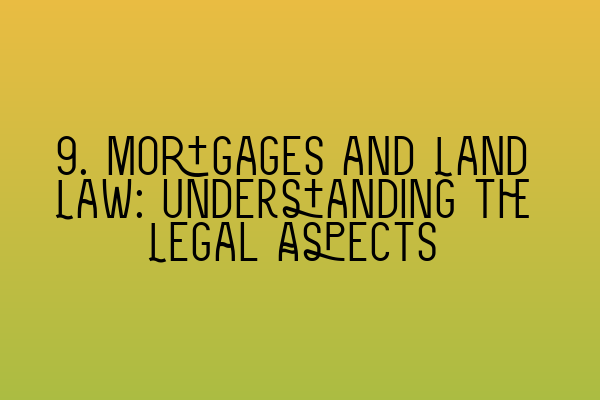**9. Mortgages and Land Law: Understanding the Legal Aspects**
Welcome to another informative blog post by SQE Property Law & Land Law! Today, we will be discussing the fascinating topic of mortgages and their legal aspects. Mortgages are an integral part of land law, and understanding their legal implications is crucial for property owners, buyers, and anyone involved in the real estate industry. So, let’s dive right in!
Before we begin, if you are preparing for the SQE 1 or SQE 2 exams, make sure to check out our related articles on SQE 1 Practice Exam Questions, SQE 1 Practice Mocks FLK1 FLK2, SQE 2 Preparation Courses, and SQE 1 Preparation Courses. Stay updated with the SRA SQE Exam Dates as well!
**1. Introduction to Mortgages**
A mortgage is a legal agreement between a borrower (mortgagor) and a lender (mortgagee) that allows the borrower to use their property as security for a loan. The property acts as collateral, ensuring the lender’s financial interest is protected. Mortgages are commonly used when purchasing a home or property, and understanding their legal implications is essential for both parties involved.
**2. Types of Mortgages**
There are various types of mortgages, each with its own legal aspects. Let’s take a look at some common types:
– Fixed-rate Mortgage: This type of mortgage offers a fixed interest rate for a set period. The legal aspect here involves understanding the terms and conditions of the fixed-rate period, including any penalties for early repayment or changes to the interest rate.
– Variable-rate Mortgage: With a variable-rate mortgage, the interest rate fluctuates with the market. Legal considerations include understanding how the interest rate is determined and the borrower’s responsibilities in case of rate changes.
– Interest-only Mortgage: In an interest-only mortgage, the borrower only pays the interest on the loan for a specified period. The legal aspect involves understanding the repayment terms, such as when and how the principal amount should be repaid.
**3. Legal Process of Mortgages**
The legal process of mortgages involves several key steps. Let’s break them down:
– Mortgage Application: The borrower applies for a mortgage, providing their financial information to the lender. The lender assesses the borrower’s creditworthiness and considers factors such as income, credit history, and property value.
– Mortgage Offer: If the borrower meets the lender’s criteria, a mortgage offer is made. This offer details the loan amount, interest rate, repayment terms, and any special conditions.
– Mortgage Deed: Once the offer is accepted, a mortgage deed is prepared. This legal document outlines the terms of the mortgage and the lender’s right to repossess the property if the borrower fails to repay the loan.
– Completion: On completion, the mortgage funds are transferred to the borrower, and the property legally becomes collateral for the loan. This is also when the borrower assumes all responsibilities, including mortgage repayments, maintenance, and insurance.
**4. Legal Implications and Obligations**
Both the borrower and the lender have specific legal implications and obligations in a mortgage agreement. Let’s discuss them in detail:
– Borrower’s Obligations: The borrower is responsible for making timely mortgage repayments, maintaining the property, and ensuring adequate insurance coverage. Failure to fulfill these obligations could result in default and potential repossession of the property.
– Lender’s Rights: The lender has the right to repossess the property if the borrower defaults on mortgage repayments. The lender can initiate legal proceedings to secure possession of the property and recover the outstanding loan amount.
**5. Land Law and Mortgages**
Mortgages are deeply intertwined with land law, as they involve the legal transfer of property rights and interests. Understanding land law is crucial when dealing with mortgages. It covers various areas such as:
– Land Registration: Land registration ensures that the legal ownership of the property is properly recorded. This process involves registering mortgages and other interests in the property with the relevant land registry.
– Easements and Covenants: Easements are legal rights that allow a person to use someone else’s land for a specific purpose. Covenants are legal obligations and restrictions that bind the property owner. Mortgages can be affected by existing easements and covenants on the property.
**In Conclusion**
Mortgages are an essential aspect of land law, and understanding their legal implications is crucial for property owners, buyers, and industry professionals. We hope this blog post has provided valuable insights into the legal aspects of mortgages.
If you are preparing for the SQE exams or simply want to enhance your understanding of property law and land law, check out our other helpful articles on SQE 1 and SQE 2 exam preparation and practice. Stay tuned for more informative content from SQE Property Law & Land Law!
Disclaimer: The information provided in this blog post is for educational purposes only and should not be considered legal advice. For personalized legal advice related to mortgages and land law, consult a qualified solicitor or legal professional.
